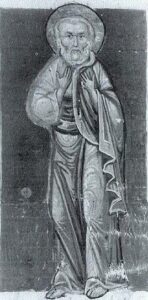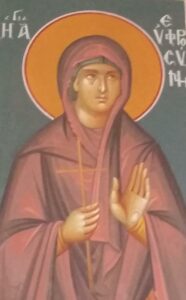We hope you had a restful couple of days away from the saintly electoral process, because we're back for another full week of exciting Lent Madness action. On Friday, just to catch you up, Theodora the Empress roundly defeated Theodora of Alexandria 75% to 25% to advance to the Saintly Sixteen, where she'll face Albert the Great.
Sometimes the Saintly Smackdown involves well-known saints. The kind of familiar names and images you may see embedded in stained glass or molded into statuary in your own parish church. And at other times, Lent Madness features Evagrius the Solitary vs. Euphrosyne. Today is one of the latter days and, as always, we enjoy introducing lesser-known saintly souls to the Lent Madness faithful. Whether or not you've heard of today's competitors, enjoy the ride!
Oh, and go vote.
Evagrius the Solitary
 Evagrius the Solitary (345-399), also known as Evagrius Ponticus, was born to a country bishop in the region of Pontus in Asia Minor. His life intersected with and impacted many of “the greats” we know today. Evagrius was ordained a lector by Basil the Great. He traveled to Constantinople and was ordained a deacon by Gregory of Nazianzus around 380. He became a protégé of Gregory when he went the way of the Jerry Falwell Jrs. of the world and became embroiled in scandal.
Evagrius the Solitary (345-399), also known as Evagrius Ponticus, was born to a country bishop in the region of Pontus in Asia Minor. His life intersected with and impacted many of “the greats” we know today. Evagrius was ordained a lector by Basil the Great. He traveled to Constantinople and was ordained a deacon by Gregory of Nazianzus around 380. He became a protégé of Gregory when he went the way of the Jerry Falwell Jrs. of the world and became embroiled in scandal.
In Constantinople, the handsome Evagrius had an affair with a married woman and had to flee when he was warned in a vision of her husband’s impending revenge. Evagrius sauntered the streets of the Holy City until he had a mental and physical breakdown, ultimately finding refuge and the restoration of his health in a monastery in Jerusalem in 383.
It is only then, around the age of thirty-eight, that Evagrius left the monastery in Jerusalem to become a semi-eremetical monk in Nitria and later Kellia in Egypt. In this monastic arrangement, monks lived in individual residences under the supervision of an abba. Over the next sixteen years, Evagrius became a renowned spiritual teacher to this community of monks. His writings and teachings had significant influence on the development of western monasticism through translations from Greek to Latin and through his ardent admirer John Cassian, who, in turn, would significantly shape the Rule of Benedict of Nursia.
While Evagrius left many works, one of the most interesting (to me, anyway) is Talking Back, a treatise on the tactics needed to defeat the eight demons that undermine monastic life: gluttony, fornication, love of money, sadness, anger, listlessness, vainglory, and pride. This book is a collection of 498 biblical passages that a monk can use to “talk back” and cut off the demon. Evagrius is especially pointed on the demon called Love of Money. He argues that monks shouldn’t confuse sufficiency with economic security and that they should live on the edge of poverty, giving any surplus to the poor.
Evagrius was rigorous and relentless in his thought and practice. Indeed, his bodily regimen proved to be so harsh that he exhausted his health within a span of just a few years. He died on the feast of Epiphany in 399 just sixteen years after arriving at the monastery in Nitria and Kellia.
Collect for Evagrius the Solitary
O God, whose blessed Son became poor that we through his poverty might be rich: Deliver us from an inordinate love of this world, that, inspired by the devotion of your servant Evagrius, we may serve you with singleness of heart, and attain to the riches of the age to come; through the same Jesus Christ our Lord, who lives and reigns with you, in the unity of the Holy Spirit, one God, now and for ever. Amen.
Euphrosyne
 Many saints are born into wealthy families. It goes without saying that they are devout followers of Christ. It is also common for them to leave their wealthy, privileged lives when their families arrange a marriage that is distasteful. These saints all seem to be strong-willed, have a clear calling for God in their lives, and deeply want to serve rather than be served.
Many saints are born into wealthy families. It goes without saying that they are devout followers of Christ. It is also common for them to leave their wealthy, privileged lives when their families arrange a marriage that is distasteful. These saints all seem to be strong-willed, have a clear calling for God in their lives, and deeply want to serve rather than be served.
Saint Euphrosyne of Alexandria is no different. Born in fifth-century Alexandria, Egypt, Euphrosyne’s parents were an older, wealthy couple who had been unable to have children. They called on the abbot of the local monastery to pray over their infertility. Shortly after that, Euphrosyne was welcomed with joy and awe and as a sign of a miracle from God. However, her mother died shortly thereafter, and she was brought up by her pious father, who took her to the local monastery for reading, writing, and theology.
Like many other girls of her time, she was promised to another family of equal social station in Alexandria, and her dad began planning the wedding festivities. Euphrosyne was not pleased. And so she prayed. Her prayers led her to a decision to run away to the local monastery (the same one that prayed for her birth), dress as a male, take on the tonsure, take on a new name of Smaragdus, and proceed to perfect an ascetic life. The word “Smaragdus” means emerald, and Euphrosyne is also known as “The Emerald of God.”
People would pilgrimage from all over to learn from Smaragdus how to pray and center their lives solely on God. One of those individuals that traveled to the monastery to learn at the feet of Smaragdus was a man called Paphnutius. He was Euphrosyne’s father but did not recognize Smaragdus in the habit and tonsure.
This deception weighed on Smaragdus’s soul, and nearing death, Smaragdus told Paphnutius their identity. This commitment to Christ and willingness to serve God touched Paphnutius’s heart, and he, too, was called to take up the tonsure and habit and live out the rest of his days in the same monastery.
In honor of this ministry and witness, the church recognizes the feast of Saint Euphrosyne of Alexandria on September 25.
Collect for Euphrosyne
Merciful God, who looks not with outward eyes but discerns the heart of each: we confess that those whom we love the most are often strangers to us. Give to all parents and children, we pray, the grace to see one another as they truly are and as you have called them to be. All this we ask in the name of Jesus Christ, our only mediator and advocate. Amen.
[poll id="309"]
119 comments on “Evagrius the Solitary vs. Euphrosyne”
Maybe Eusophryne’s dad just wanted grandkids in his old age!
Oops... that’s Euphrosyne!! Hahahahaha
Evagrius' sins were so numerous I came to the conclusion the only reason he is a saint is because he died before his next amorous or other adventure.
I tried to make this a hard choice. Alas, I like happy endings. I also like that either Smaragdus was so beautifully integrated, or Anna Fitch Courie percieved (decided, thought, recognized, knew) and therefore wrote "Smaragdus told Paphnutius THEIR identity." Then summed it all up in the perfect collect for all families and suddenly it was very personal. "Give to all parents and children, we pray, the grace to see one another as they truly are and as you have called them to be. All this we ask in the name of Jesus Christ, our only mediator and advocate. Amen."
I recently watched a discussion of comedic roles for women in Shakespeare, and mostly they talked about As You Like It and Twelfth Night, both featuring women who dress as men. One actress opined that she thought the best role for a woman Shakespeare ever wrote was Rosalind. I was in a production of As You Like It some decades ago (playing Adam, Orlando's faithful servant), and I much enjoyed the production. Keeping in mind that in Shakespeare's time Rosalind would have been played by a boy, who was then playing a girl disguised as a boy, I will vote for Smaragdus. Although I didn't have much professional success at it, theatre has enriched my entire life since.
Methinks I'm about to break my streak (I'm eight for eight so far) by casting my vote for Evagrius, but I find him much more 'real' than Euphrosyne. As a woman who has been both wife,mother, and grandmother, and is about to embark on great-grandmotherhood, I have to confess that I'm very tired of all these women who scorned marriage and motherhood. While I am intrigued by the idea that Euphrosyne/Smaragdus may have been transgender, I believe it to be more likely that she was yet another Marina/Theodora of Alexandria, and I fail to comprehend how one who lives a life of deception can be regarded as a saint. Evragius, on the other hand, repented of his wrong-doing and devoted the rest of his life to helping others to change their ways. I have a premonition that as of tomorrow I'll be eight for nine, but Evragius is my choice.
I agree with Sarah P, but I still voted for Evagrius.
Another brave woman that dedicated her life to God.
I voted for Evagrius simply because his story was a bit different. The runaway don't-wanna-be-a-bride-would-rather-be-a-monk seems to be fairly common. But I can see Euphrosyne looks to walk away with this one.
This one was hard for us, my Aunt and I, but we chose Euphrosyne. But it was hard too, because I read the entries to my Aunt and so I have to try to pronounce those names. Sue
Evagrius
Eternal feminine figure
Miracle child, long sought after
Ever faithful to the Lord
Ran to the monastery to avoid regret
Anointed by God
Lived in the skin of a man
Divulged her true identity, drawing her Father to become her brother
(St. Mark's members & friends, ABQ NM)
Monks didn't bathe much, and probably wore (and maybe had) dirty habits.
Long ago I visited half a dozen monasteries in Romania. The monks tended to look blissed out. The nuns tended to look overworked, worn out, and fed up. If there was anything in this distinction that was inherent in the way men's and women's monasteries worked, I can well see how a daring person might have preferred to become a monk rather than a nun.
Ok, I'm a day late and a vote short on this one due to a migraine yesterday. I gotta say, the thing that hit me most was the thought: She was name Euphrosyne and couldn't do better than Smaragdus as a new name. Yeah, probably not the most important takeaway, and it does mean a beautiful thing. I would have voted for her despite all that. Plus I like the fact that there is a somewhat transgender person in the past that was sainted.